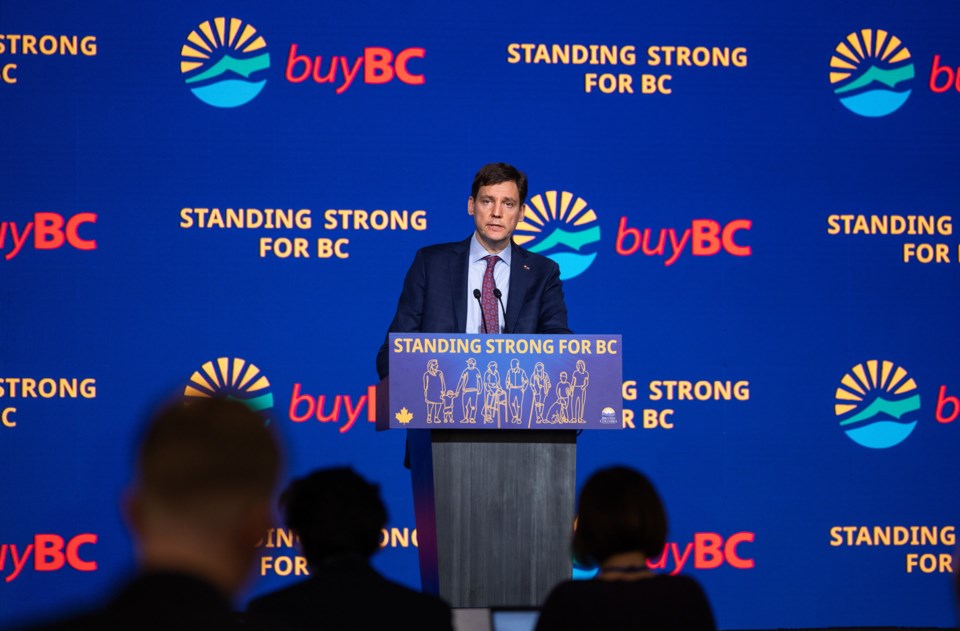No matter where you stand on the NDP’s slim election win in October 2024, there was likely at least some small comfort in the new government’s promised grocery rebate—up to $500 for individuals and up to $1,000 for families—a key plank in its re-election platform.
But with the release of B.C.’s budget last week, the rebate is officially dead, as U.S. President Donald Trump continues his on-again, off-again love affair with tariffs against Canada, throwing every last plan into chaos, confusion and uncertainty.
While it is always disappointing (and sadly never surprising) to see election promises broken, it is perhaps worth affording the government some leeway on this one. The political and financial climate we’re living in today is suddenly worlds apart from the one the NDP campaigned in back in October, and Trump’s chaotic, back-and-forth, up-and-down trade policy effectively makes it impossible to plan. What he says and does today could be completely different come tomorrow.
Case in point: after Trump finally levied tariffs against Canada on Tuesday, March 4, Pique reached out to local leaders for reaction. Before any could officially respond, on March 6, the U.S. paused tariffs on goods that meet the rules of origin requirements under the Canada-U.S.-Mexico Agreement, and lowered levies on potash to 10 per cent until April 2.
Then, on Tuesday, March 10, Trump said he will double the tariff on steel and aluminum imports coming from Canada in response to Ontario’s surcharge on electricity exports to the United States. Tuesday is Pique’s weekly deadline day, so God himself only knows where the flip-flopping will land by the time we hit the stands Friday.
“While the situation is constantly changing, Canada’s provincial chambers of commerce have come together to present An Agenda for Economic Growth and Stability, a set of recommendations to drive economic growth, strengthen domestic trade, and elevate Canada’s global competitiveness,” said Whistler Chamber executive director Louise Walker in an email.
“To better understand the impact on Whistler, we have collected data from businesses, which we will share with the Canadian and BC Chamber of Commerce. As per feedback from members, we are currently curating tools on government guidance, supply chain alternatives and detailed tariff lists. As the situation evolves, we are taking note of this week’s announcements.”
The confusion is baked into B.C.’s budget, with Finance Minister Brenda Bailey referring to Trump’s uncertainty as a feature, not a bug.
“I do expect it to continue. And this budget was designed with that in mind, knowing that that uncertainty is at play and is likely to continue being at play,” she said. “And the decision that we’ve made in that context is to support the services that British Columbians most depend on, while being very focused in our spending.”
The budget contains a $4 billion contingency fund, and the NDP hopes the federal government will funnel some of its counter-tariff revenue back to the provinces to help even things out. But with a record-setting $10.9 billion deficit, at the outset of a trade war with our closest neighbour and ally, the current overall financial outlook is anything but bright. The NDP expects the trade war to result in a cumulative economic impact of about $43 billion over the next four years.
As for what’s in the budget in terms of direct benefits for Whistler and the Sea to Sky, the answer is: not much.
Despite the Cooperation and Responsible Government Accord signed between the NDP and the province’s two Green MLAs—which includes a commitment to implement “frequent, reliable, affordable regional transit” on key inter-regional routes on Vancouver Island, along with “a focus on Sea to Sky corridor transit in 2025”—there is no specific mention of funding regional transit in the Sea to Sky in Budget 2025 (and in fact, the words “Sea to Sky” don’t appear anywhere).
The budget notes tourism activity is on the rise of late, with international travellers up 6.9 per cent year-to-date to November 2024 (about 691,437 travellers per month). The number of U.S. visitors reached a new high in September, and had increased by 6.9 per cent year-to-date to November. Meanwhile, the number of non-U.S. visitors also increased by 6.9 per cent year-to-date (though still below pre-pandemic levels).
Aside from that, there are scant few mentions of tourism in the budget, to go along with a flat ministry budget of $192 million for the next three years, and nothing in the way of new investments. Ditto for the Ministry of Environment and Parks, one of a select few ministries to actually see a reduction in its budget, from $225 million in 2024-25 to $221 million for the next three years.
What else is being de-prioritized, however temporarily?
The Ministry of Emergency Management and Climate Readiness will take the biggest hit, percentage wise, from $467 million in 2024-25 to $125 million for the next three years, a decrease of 73 per cent. The Ministries of Finance (down 44 per cent, from $2.7 billion to $1.5 billion), Forests (36 per cent; $1.3 billion to $891 million), and Agriculture and Food (37 per cent; $229 million to $143 million) also saw their budgets slashed.
Even with those cuts, the total spend for all ministries rose from $64 billion in 2024-25 to an estimated $66 billion in Budget 2025.
It’s hard to stay optimistic, financially, when our much larger neighbour to the south seems hell-bent on crippling our economy for the purpose of annexing us. Never thought I’d write that sentence, but here we are. Chaos and confusion rule the day, and they will for the foreseeable future.
For now we stay the course—and keep those elbows up.




